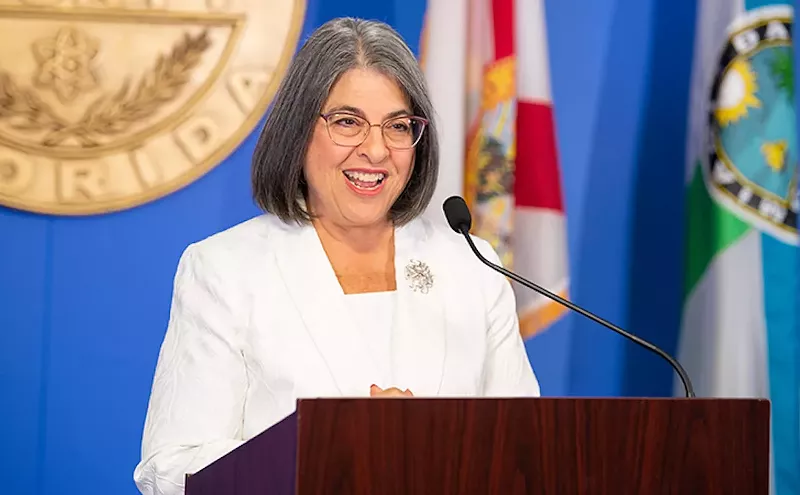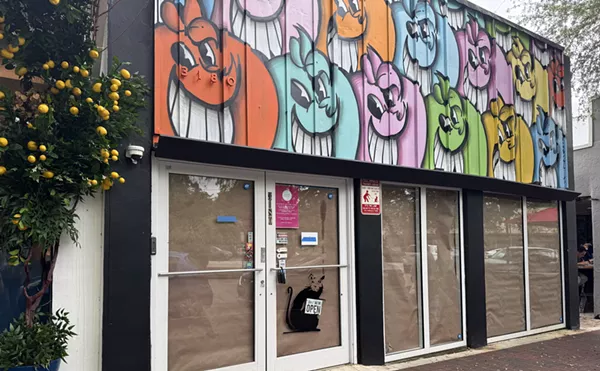This same guitar broke earlier, during the first verse of "Jessie's Girl." Springfield's scramble to repair the instrument stretched the bouncy little single into a jam of Grateful Deadly proportions. Now, as he tries to finish another of the songs that once powered a million high school pom-pom routines, the guitar strings refuse to stay in tune. In frustration Springfield tears the guitar from his neck, waves it overhead, and smashes it against the stage in what is probably the most justified instrument demolition in rock history. But there is one complication: The guitar won't break. The former soap opera actor starts going General Hospital on its ass, flogging the six-string with a fury not seen at a Miami sporting event since Kiss rocked the Super Bowl pregame. Nothing. Again. Nothing. Not even a splinter.
"He'll never be The Who," cracks 55-year-old Gordon Stevens, one of several thousand spectators. "He's no Pete Townshend."
Maybe not. But he's close enough for David Rovine, the promoter who booked Springfield for this gig. Technically Rovine isn't a concert promoter; he's the head of Gulfstream Park's marketing department. In the past three years, however, Rovine has made his name as a rock impresario. He books more than twenty shows per racing season. The Doobie Brothers. Air Supply. Cheap Trick. Thanks to his efforts, Gulfstream Park, located along U.S. 1 just over the county line in Hallandale, is more closely associated with rock music than any racetrack outside Altamont.
And it's this association that infuriates long-time race fans, who insist that Rovine has reduced one of the country's premier winter tracks to a classic-rock tourist attraction. The prestigious Breeders' Cup ran twice at Gulfstream, in 1989 and 1992, and will return in November. Among the great horses to circle the track's oval are Northern Dancer, Spectacular Bid, and Cigar. Yet almost all newspaper, radio, and billboard promotion of the racetrack ignores these showcase steeds. When reigning horse of the year Favorite Trick debuted as a three-year-old last season, for instance, Rovine put the promotional emphasis on a concert featuring The Guess Who.
He portrays cross-promotion as key to surviving in the slumping world of thoroughbred racing, and insists his concerts have drawn thousands of people to the track who otherwise wouldn't come. In his grand vision, these visitors, with some careful nurturing, will grow into the next generation of bettors.
"The racing press doesn't particularly care for it," he concedes, referring to his "rock first, bet later" campaign. "They're part of the older racing audience that says, 'Why are you doing that? I've loved racing for 40 years since I was brought by my dad.' I always say, 'Where's your son? Do you have your son with you today? Is your daughter with you today?' And most of them don't. They were brought by their fathers 40 years ago, but somehow they failed to bring their children, and that's who I'm going after, basically."
Bill Graham drifted to San Francisco in the early Sixties. An exile of Nazi Germany, he worked a series of odd jobs -- waiter, amateur actor, cab driver -- before he became the business manager of a struggling guerrilla mime troupe. Funds were so tight that Graham was compelled to hold a benefit concert at the Fillmore Auditorium. In doing so he found his calling; the Fillmore show became the first of hundreds of concerts Graham would book featuring seminal rock acts such as Janis Joplin, Jimi Hendrix, and Moby Grape. In time Graham established himself as the dominant promoter in American rock history.
The parallels between Bill Graham and David Rovine are obvious. Jefferson Airplane debuted at the Fillmore before rechristening itself Jefferson Starship and playing ... at Gulfstream. Santana soloed for hours at both venues. Graham promoted a concert at San Francisco's Winterland Auditorium for eventual Gulfstream headliner Bachman-Turner Overdrive. In 1991 Graham died in a helicopter crash as he flew home from a concert featuring Huey Lewis and the News -- the same group that sort of rocked Gulfstream Park's 1999 season opener. "That was a great show," Rovine recalls. "We smashed the attendance projections for that day with more than 31,000 people, the biggest opening day in the 60-year history of the track."
Rovine is in his office, leaning back in a blue leather chair. He is an imposingly tall man, 50 years old, with his children enshrined in snapshots on a credenza behind him. He wears a well-groomed mustache, which is somewhat unfortunate, for with it he is an absolute carbon copy of the principal in the movie Ferris Bueller's Day Off, a comparison he hears incessantly from his enemies.
He runs the entire marketing department, overseeing a dozen employees during the season, which runs from January 3 to next Tuesday, March 16. His office walls are plastered with posters of top horses and marquee stakes races. A wall opposite his desk features a series of laminated calendars on which special giveaways are scrawled in erasable black ink. On each weekend day, a yellow Post-it note clings to the calendar, announcing the band booked for that day. January 24: Taylor Dayne. January 31: Buster Poindexter. February 28: Christopher Cross. Last season only Saturday was concert day. This season Rovine booked shows for every single Saturday and Sunday.
Rovine's own background is a curious amalgam of show business and racing. For years he operated a dinner theater in Orlando. Later he achieved his own distinction as the top trainer at the Meadowlands harness track, claiming more than a million dollars in winnings in one year. Tax losses combined with the ongoing troubles of the harness-racing industry prompted Rovine to accept a marketing job with the Rosecroft racetrack outside of Washington, D.C. His decision to hold a Drifters concert at the park in 1994 set an attendance record and led him to believe he'd discovered racing's future.
"We're trying to be more like Las Vegas," Rovine says bluntly. "Las Vegas and Atlantic City are wildly successful, so why don't we look at them to see what they're doing right? Well, they've got a lounge act going on, they've got multiple games going on. They got this and that, with constant action and constant activity. From day one they have successfully blended entertainment with their product. Vegas is doing what I'm trying to do."
Like most racetracks nationwide, Gulfstream faces a diluted gambling market. South Floridians can wager on Seminole or Miccosukee bingo, jai alai, the Florida Lottery, or dog racing just as easily as they can play the ponies. Industrywide, annual attendance at horse tracks has dropped from 54.4 million in 1991 to 34.4 million today, according to International Gaming and Wagering Business magazine. Over the past quarter-century, the sport's share of all wagering has dived from 28 percent to less than 10 percent. In South Florida attendance continues to decline at both Calder and Hialeah racetracks.
In contrast Gulfstream Park's attendance has grown by 25 percent on Saturdays since Rovine threw his first concert three seasons ago. The handle (the total amount of money bet) grew by nineteen percent during that same period.
"I am a realist," he says. "A lot of people in racing four or five years ago knew there was a problem but didn't want to admit it. I felt that if racing is to survive into the year 2000, it must change its face. Period. My goal is to reposition Gulfstream Park as an entertainment facility featuring world-class thoroughbred racing, rather than having it be simply a world-class thoroughbred racetrack."
Toward that goal, Rovine has erected a small stage on the grassy expanse just outside the main grandstand. Palm trees rise behind the stage's white canopy like candles on a birthday cake. Concerts are included with each three-dollar general-admission ticket, making them an incredibly cheap show.
The concerts and the horses run simultaneously. Rovine starts his shows two hours after noon, or about post time in the track's fourth of eleven races. (The sound is engineered not to travel far beyond the stage, so as to not disrupt the horses.) "Concerts have been going on for years," Rovine notes, adding that the Beatles played at Suffolk Downs. "But they've either done them before or after the racing, because the racing management has been afraid to disrupt the day. I've found that when you hold a concert after the race, the racing public is leaving while the concertgoers are entering. It's imperative that the concert take place while the racing is going on so that after the concert they can walk over and watch a horse race."
To awaken the potential gambler hidden inside every Buster Poindexter fan, Rovine created the Inside Track Room. This glassed-in studio is a training ground for new fish eager to learn the ancient art of pari-mutuel gambling. After each show extraordinarily perky college drama students explain everything from the basics (win, place, and show) to more complex bets (the superfecta part-wheel).
"This [promotional strategy] is not brain surgery," Rovine acknowledges. "I spent twenty-some years in racing, and I love it, but my love of it will not bring one person to this door. And I've got to be able to get 'em in the door. Then I'm going to teach 'em how to play the game. And we teach newcomers how to play the game better than anyone else in racing.
"It's common sense," he continues. "At least it is to people outside the industry. People inside the industry, though, hate it."
Dave Joseph, for one. "Somebody, anybody, stop Gulfstream's new marketing department," pleaded the Sun-Sentinel's racing writer soon after Rovine arrived at the track in 1995. "Although Gulfstream will have the best racing in the country this winter, the folks in the marketing department are doing everything they can to cheapen a meet with sideshows and music acts that will not lure new fans."
Four seasons later Joseph rages on. "Stuttering ventriloquist: That's about the only act Gulfstream's marketing department didn't bring in this season [March 17, 1996]." "Has anyone on Gulfstream's management team bought a piece of music recorded after 1965? [March 3, 1998]" On February 21, 1999, Joseph again railed against Rovine's concerts in his weekly column: "It's time Gulfstream realized that racing is their primary business."
Joseph is not alone. "I don't want to sound like the last angry man," says WQAM-AM (560) host Hank Goldberg, who also serves as ESPN's horse-racing expert. "But last Sunday I didn't even bother going to the track. I played golf. It was the first time I can remember having a day off and not going to the track, and I'm talking about in my entire life. I just couldn't take it anymore."
Before becoming a broadcaster, Goldberg worked for years in advertising. This background bolsters his conviction that Rovine has strayed far afield from the product he's supposed to be selling, which ain't classic rock. "The appeal of horse racing is the same appeal that the lottery sells," Goldberg asserts. "It's a chance to win money. Say someone goes to the track and he has a sister who has red hair. He notices that in the fifth race there is a horse named Red Headed Glory and another named, oh, I don't know, Red Headed Bombshell. So he bets them 1-2 and they come in. I don't care how much he wins, that's pretty exciting stuff. It's a lot better than trying to drink 50 beers just to sit through Rick Springfield."
Goldberg says he's skeptical of the rosy numbers Rovine cites in support of his concerts. The increased attendance figures are unimpeachable, but the claims of increased betting totals are not. Although betting is up overall, Goldberg believes that's not so much because of the concerts but rather the introduction of betting on races simulcast from California. The on-track per capita, or the amount of money bet per person on races run at the track, remains low. On opening day, for instance, when Huey Lewis helped smash the attendance record, the on-track per capita was $65, the lowest number in several years. "At most major tracks," Goldberg says, "the per capita is at least twice that." In other words concerts may draw folks to Gulfstream, but they don't necessarily turn rock fans into race fans.
"Let me put it another way," Goldberg ventures. "The other day I went over to the track because I had some winning tickets from Santa Anita I needed to cash. I was hanging around and looking at the tote board when I decided to bet the second race -- what the hell. So I select a trifecta box for $24. The winning horse came out of the clouds to win, a 35-1 shot. And I won $5500." Goldberg, who is 58 years old, pauses to let the figures sink in: $5500 on a $24 bet. "Now," he asks, barely suppressing a chuckle, "isn't that better than Christopher Cross?"
Uh, yep. Most folks would probably agree that winning $5500 on a chance bet beats listening to the man who sang "Arthur's Theme." But Rovine insists the Goldbergs of the world are a dying breed. "You have to inject entertainment elements into a day at the races," he maintains. "You have to take something that the American public believes is entertaining -- because right now they're not thinking that racing is entertaining -- and you have to stick it in."
Rovine stresses that he's not necessarily expecting his strategy to pay immediate dividends. Rather he's hoping to convert casual visitors into race fans (and bettors) somewhere down the line. And what better hook than classic rock, a proven draw for people between the ages of 30 and 45, the demographic Rovine covets. "If I can get them coming here regularly on Saturday and Sunday," he says, "when they reach that state in their life when they can take a little more time off and kick back in the middle of the week, I hope they will choose a day at the races as part of their relaxation," he says. "Because don't forget, right now they're playing golf, they're fishing and boating, and playing tennis."
After rejecting the hedonism of his first ensemble, The Guess Who, deeply religious guitar player Randy Bachman banded together with his brother Tim and bassist/vocalist Fred Turner to found Bachman-Turner Overdrive, the world's greatest all-Mormon rock group. The pride of a caffeine-eschewing sect of Winnipeg, Manitoba, proceeded to score two or three hit singles before releasing a greatest hits album in 1976. Not much has happened since. Randy Bachman left in 1977, and the group disbanded two years after that. Heavy rotation on classic-rock radio stations (and a bit of a renaissance as the spokesgroup for an office-supply chain) enables different members of the band to tour, either under the original name or as BTO, depending on who's singing at the time.
In a cross-promotional move that would no doubt turn Hank Goldberg's stomach, Gulfstream's second race this Saturday afternoon -- a seven-furlong affair -- has been dubbed the BTO Stakes. As the horses enter the gate, hundreds of windbreakered race fans fill the plastic lawn chairs along the clubhouse rail. With racing forms and Sun-Sentinels folded on their laps, they roar as the horses hustle for the $10,000 purse. "C'mon, Pat!" a gray-haired man shouts to Pat Day, the jockey aboard Backston Hill. "C'mon, Pat! You're right there!" Right there in second place. Backston Hill finishes behind Valid Reply.
The walk from the track to the concert stage cuts through the grandstand. Cigar-chomping gamblers mill about at several rows of betting windows, staring at their programs. Food booths serve bagels, black beans, and North Carolina barbecue. For more discriminating diners, the Royal Palm and the Terrace dining rooms await. Up an escalator in the Grand Hall, a giant tote board flashes odds on the next race. For anyone interested in a little OTB with their BTO, a bank of television screens broadcasts racing simulcasts from Oaklawn, Laurel Park, and Aqueduct.
Back outside in the sunshine beyond the grandstand, Rovine climbs onto the concert stage wearing an out-of-place gray suit with matching tie. He marches over to a microphone near the drum set and taps it with his finger. "How's everybody doooooing this afternoon?" he bellows, looking a lot like a school principal addressing a pep rally. "Who here likes classic rock?"
Before him unfolds his Vegas. A couple of thousand people who do indeed like classic rock bake in the grass adjacent the grandstand, most sitting on lawn chairs or blankets they brought themselves. Many sport faded black Harley wear, though a few tie-dyed shirts colorize the assembly. The T-shirt of one potential future race fan identifies him as "100 percent rebel and damn proud." A promotional vehicle, classic-rock station BIG 106's (WBGG-FM 106.0) Hummer, idles nearby.
There are several thousand more people within earshot, many of them kids. On Sundays, family day, even more youngsters bound up and down on an amusement-park air mattress, or dangle from a portable rock-climbing wall. Toddlers ride ponies in a square corral set up to the side of the stage. Today, like every day, cart vendors dispense salty pretzels, lemonade, and cold Miller beer. In the distance lies the paddock, where horses parade for gamblers before each post. The racetrack itself is not visible.
Rovine announces some upcoming concerts. The Little River Band gets a smattering of cheers, though it's nothing compared to the whoop released in honor of the return of The Guess Who (the Bachman connection resurfacing). "How about a round of applause for Charlie Horse, ladies and gentlemen?" Rovine implores as an equine mascot stumbles onstage, its human occupant clearly struggling with a loss of peripheral vision. The horse helps Rovine host a simulated race, with the crowd wagering on their knowledge of BTO trivia. What year did BTO's single "You Ain't Seen Nothin' Yet" hit number one? A man in the front of the stage bleats out the answer: 1974.
With a final exultation to the crowd, Rovine gives way to the band. Lead singer Fred Turner proceeds to celebrate the silver anniversary of his creative dry spell by singing "Takin' Care of Business" for what must be the ten millionth time. His face is flushed with sunburn. A brown bass guitar presses against his substantial belly. "And at Gulfstream Park in Hallandale, Florida," he calls out, "they were singing..."
Alert to its duties, the crowd warbles the refrain: "Taking care of business!"
It's a refrain, of course, that applies just as well to Rovine. He plans to continue holding concerts like this one every weekend next season. And he has his boosters. "No one has come up with a better idea," says Scott Savin, president of the Florida Horsemen's Benevolent and Protective Association. "It is at least bringing more people out to the track, which is the first step toward converting them into race fans."
Gulfstream president Douglas Donn admits he's not terribly crazy about the music. But like Savin he can't argue with 5000 more people coming out to his park, even if it is primarily to see a band like BTO. Rock is good business, he says, because people just aren't drawn to a horse track by traditional advertising. "I love thoroughbred horse racing," he declares. "I love it so much that I don't know why other people don't want to be here all the time. The reason they aren't here, I believe, is because they don't know how attractive the sport is. And you can't show them until you grab them by the hand and bring them here. Traditionalists think it's enough just to talk about the racing, but I don't."
The concert ends after about 45 minutes. Groupies (they still exist) line up to collect autographs, possibly in hopes of identifying who is actually playing in the band today. More than a few of the Harley shirts can be seen loitering along the track rail, where jockey Jorge Chavez is knocking them dead, winning a phenomenal six mounts.
Beside the now empty concert stage is the Inside Track Room, Rovine's custom-made incubator for future bettors. To his delight the room is actually crowded with classic-rock fans. One of the drama students, using exaggerated arm movements, portrays the potential excitement inherent in a correctly predicted exacta wager. The man in the rebel T-shirt applauds politely, on cue. Perhaps somewhere in his damn proud brain he's scheduling his leisure activities for the next 30 years, and leaving some room open for Gulfstream.
At least one gambler at the track today is betting on it.
Art Garfunkel performs 2:00 p.m. Saturday, March 13 and Warren Hill performs 2:00 p.m. Sunday, March 14 (last concert of the season) at Gulfstream Park, 901 S Federal Hwy, Hallandale. Concerts and program are included with $3 admission to the park. Call 305-931-7223 for details.












